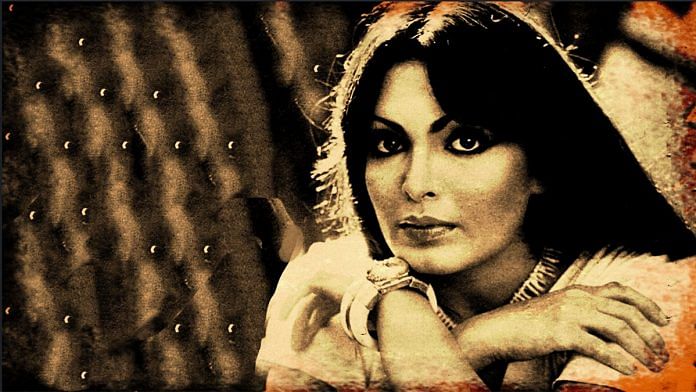It’s been more than a decade since the death of Parveen Babi, who helped redefine the Bollywood heroine in the 1970s with oodles of glamour and sex appeal.
Babi, who appeared on the cover of Time magazine in 1976, was dubbed the “swadeshi Marilyn Monroe” by India Today, and the comparison was not far off — a former fashion model, she was known more for the way she wore her sexuality than for her acting chops. But in an era that still showcased Sati Savitri female leads, Babi and her contemporary Zeenat Aman were the epitome of ‘bold’, on and off the screen.
Babi was also among the rare celebs to have a well-documented history of mental illness — she was apparently diagnosed with paranoid schizophrenia and lived with it for years.
Her rumoured relationships with actors like Kabir Bedi, Amitabh Bachchan, Danny Denzongpa and filmmaker Mahesh Bhatt also kept the gossip rags interested in her long after she had left the film industry in the 1980s, as did the increasing paranoia that shone through in later interviews.
Becoming an actress
Babi was born on 4 April 1949 in Junagadh, Gujarat. Her father, Vali Mohammed Khan Babi, was a system administrator in the court of the Nawab of Junagadh. She was educated at the Mount Carmel High School in Ahmedabad and later pursued a bachelor’s degree from St Xavier’s College in the same city.
She was discovered by filmmaker B.R. Ishara near her college while smoking a cigarette. He was so taken in by her appeal that he offered her a lead role in his film Charitra (1973), opposite cricketer Salim Durrani.
While the film bombed, Babi was noticed and snapped up for a series of roles opposite the leading superstar of the era, Amitabh Bachchan, beginning with Majboor (1974) and including big-ticket movies like Deewar (1975), Amar Akbar Anthony (1977), Kaala Patthar (1979) and Shaan (1980). She also appeared with Bachchan in Namak Halaal (1982), though she played Shashi Kapoor’s love interest. The chartbuster songs Jawani jaaneman and Raat baaki baat baaki were picturised on her.
In all, in her 10-year career, she appeared in about 50 films.
Love and loss
As mentioned above, Babi was rumoured to have had a string of unsuccessful romances with actors, but the only one that has been publicly acknowledged is the one with Mahesh Bhatt, who left his wife and daughter to be with her.
Bhatt made two semi-autobiographical movies about his relationship with Babi — Arth (1982) and Woh Lamhe (2006).
Their relationship coincided with the growth of Babi’s mental health issues, and Bhatt acknowledged that her paranoia sometimes worried him.
“How can I ever forget that heartbreaking image of her, when I walked into the house that evening, and found Parveen, in make-up and a filmy costume, cowering in a corner, with a knife in her hand, shivering with fear? She looked like an animal, one that I had never seen before. ‘Close the door Mahesh,’ she whispered. ‘They are coming to kill us. Close the door quickly!’” Bhatt told Pinkvilla in 2012.
“The tape (sent by her) contained a letter that Parveen had recorded and sent me, in which she talked about her approaching illness, her loneliness and her need to get out of the entertainment business. The silences between her words spoke to me more eloquently than her words did. The only regret I have is that I couldn’t see her illness coming. Looking back, I realise now that there were so many signs that I just failed to read.”
Bhatt introduced Babi to the spiritual guru U.G. Krishnamurti, with whom she travelled to the US twice in search of inner peace. It was the second of these sojourns for which Babi abruptly quit the film industry in 1983.
Also read: Narendra Modi looks at Bollywood’s ‘soft power’ for sequel to his government
The last two decades
In 1984, Babi was detained at JFK Airport in New York for failing to prove her identity and behaved in a ‘difficult’ manner.
She returned to India in 1989, and over the next few years, grew increasingly paranoid, accusing Bachchan and even the likes of Bill Clinton, Robert Redford, Prince Charles, Al Gore, and a host of the world’s governments and intelligence agencies of trying to kill her.
She was found dead on 22 January 2005 in her Juhu flat, having died on 20 January due to diabetes complications and multiple organ failure.
Also read: Veteran Bollywood actor Kader Khan dies at 81 after prolonged illness



